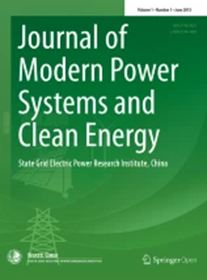Pilot Protection Based on Backward Traveling-Wave Voltage Difference for Submarine Cables of Low-Frequency Transmission System with Integrated Offshore Wind Power
IF 6.1
1区 工程技术
Q1 ENGINEERING, ELECTRICAL & ELECTRONIC
Journal of Modern Power Systems and Clean Energy
Pub Date : 2024-12-04
DOI:10.35833/MPCE.2024.000448
引用次数: 0
Abstract
Multiterminal low-frequency transmission system (LFTS) has promising potential for large-scale offshore wind power integration. Nevertheless, the existing protection suffers from low sensitivity, and even operates incorrectly because the converters connected to both ends of cables change fault characteristics substantially. To address this problem, this paper firstly inspects the adaptability of current differential protection, revealing the manner in which control strategies after fault impact the sensitivity of the existing protection. Then, based on the characteristics of armored three-core cable, phase-mode transformation is utilized to decouple the fault information and the specific moduli are selected to reflect all kinds of fault types. The expression of backward traveling-wave (BTW) voltage based on interpolation is derived under the condition of low sampling frequency. Finally, a pilot protection based on BTW voltage difference for submarine cables of LFTS with integrated offshore wind power is proposed, which has higher sensitivity because the difference between BTW calculated from local information and the one from remote information is considerable during fault transient period. Simulation tests compare the performance of the existing protection with that of the proposed protection. Extensive simulations corroborate that the proposed protection reliably identifies the fault cable in various fault scenarios.基于反向行波电压差的海上风电集成低频传输系统海底电缆导频保护
多终端低频输电系统(LFTS)在大规模海上风电集成中具有广阔的应用前景。然而,由于连接在电缆两端的变流器故障特性发生了很大的变化,现有的保护存在灵敏度低,甚至操作不正确的问题。为了解决这一问题,本文首先考察了电流差动保护的适应性,揭示了故障后控制策略对现有保护灵敏度的影响方式。然后,根据铠装三芯电缆的特点,利用相模变换对故障信息进行解耦,选择具体的模量来反映各种故障类型;在低采样频率条件下,推导了基于插值的反向行波电压表达式。最后,提出了一种基于BTW电压差的综合海上风电LFTS海底电缆导频保护方法,该方法在故障暂态期间,由于局部信息计算的BTW与远程信息计算的BTW相差较大,因此具有较高的灵敏度。仿真试验比较了现有保护与拟议保护的性能。大量的仿真验证了该保护方法在各种故障场景下对故障电缆的可靠识别。
本文章由计算机程序翻译,如有差异,请以英文原文为准。
求助全文
约1分钟内获得全文
求助全文
来源期刊

Journal of Modern Power Systems and Clean Energy
ENGINEERING, ELECTRICAL & ELECTRONIC-
CiteScore
12.30
自引率
14.30%
发文量
97
审稿时长
13 weeks
期刊介绍:
Journal of Modern Power Systems and Clean Energy (MPCE), commencing from June, 2013, is a newly established, peer-reviewed and quarterly published journal in English. It is the first international power engineering journal originated in mainland China. MPCE publishes original papers, short letters and review articles in the field of modern power systems with focus on smart grid technology and renewable energy integration, etc.
 求助内容:
求助内容: 应助结果提醒方式:
应助结果提醒方式:


